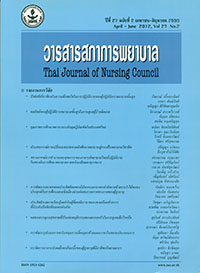ประสบการณ์การเปลี่ยนบทบาทจากนักศึกษาพยาบาลสู่การเป็นพยาบาลวิชาชีพ
Keywords:
ประสบการณ์, การเปลี่ยนบทบาท, นักศึกษาพยาบาล, พยาบาลวิชาชีพ, experience, role change, nursing students, registered nursesAbstract
บทคัดย่อ
การวิจัยครั้งนี้ มีวัตถุประสงค์เพื่อศึกษาประสบการณ์การเปลี่ยนบทบาทจาก นักศึกษาสู่การเป็นพยาบาลวิชาชีพ โดยใช้วิธีการวิจัยเชิงคุณภาพตามแนวคิดปรากฏการณ์ วิทยาของฮัสเซิล เก็บข้อมูลวิจัยโดยการสัมภาษณ์แบบเจาะลึก ผู้ให้ข้อมูลเป็นพยาบาล วิชาชีพที่สำเร็จการศึกษาหลักสูตรพยาบาลศาสตรบัณฑิต ประจำปีการศึกษา 2550 จาก คณะพยาบาลศาสตร์ มหาวิทยาลัยธรรมศาสตร์ จำนวน 13 ราย เก็บรวบรวมข้อมูลโดย การสัมภาษณ์เชิงลึก วิเคราะห์ข้อมูลเชิงเนื้อหาตามหลักการของโคไลซี ผลการศึกษาพบว่า ผู้ที่อยู่ในช่วงของการเปลี่ยนบทบาทจากนักศึกษาพยาบาลเป็น พยาบาลวิชาชีพ ให้ความหมายของการเปลี่ยนบทบาทใน 2 ลักษณะคือ 1) การเป็นพยาบาล วิชาชีพอย่างเต็มตัว และ 2) ชีวิตกับเวลาที่เปลี่ยนไป ส่วนความคาดหวังที่เกิดขึ้นเมื่อเปลี่ยน บทบาท ประกอบด้วย 7 ประเด็นย่อยคือ 1) การเป็นพยาบาลที่ดี 2) การมีผู้ร่วมงานที่ จริงใจ ให้ความช่วยเหลือ 3) การมีส่วนร่วมในการพัฒนางานและองค์กร 4) การมีรายได้ที่เพียงพอ 5) การได้ทำงานในแผนกที่ต้องการและได้รับการยอมรับจากแพทย์ 6) การมี โอกาสพัฒนาตนเอง และ 7) การมีแหล่งสนับสนุนช่วยเหลือเมื่อมีปัญหา ซึ่งความรู้สึกที่ เกิดขึ้นในช่วงที่มีการเปลี่ยนบทบาท ประกอบด้วยประเด็นย่อย 5 ประเด็นคือ 1) กลัว เครียด และวิตกกังวล 2) เหนื่อยหน่ายท้อแท้อยากลาออก 3) สับสนในบทบาท 4) มีความสุข ท่ามกลางรอยยิ้ม คำชื่นชมและคำขอบคุณจากผู้รับบริการ และ 5) ภาคภูมิใจที่ได้ตอบแทน บุญคุณพ่อแม่ ส่วนปัญหาที่ต้องเผชิญในช่วงของการเปลี่ยนบทบาท ประกอบด้วย 4 ประเด็นย่อย คือ 1) ความไม่เข้าใจในระบบงาน 2) การทำงานท่ามกลางความขัดแย้ง 3) ความคาดหวัง สูงจากผู้ร่วมงาน และ 4) การไม่สามารถมอบหมายงานได้ตามบทบาทหน้าที่ ส่วนวิธีการ เผชิญปัญหามี 4 วิธี คือ 1) ทำใจยอมรับสภาพปัญหา 2) ยึดหลักตนเป็นที่พึ่งแห่งตน 3) ปรึกษาผู้รู้และมีประสบการณ์ 4) พูดคุยระบายปัญหากับคนที่ไว้ใจและเข้าใจกัน ผลการวิจัย สามารถใช้เป็นข้อมูลสำหรับนักศึกษาพยาบาล ในการเตรียมความพร้อม สู่การเป็นพยาบาลวิชาชีพ สถาบันการศึกษาพยาบาลสามารถนำไปใช้ในการเตรียมนักศึกษา เพื่อช่วยให้นักศึกษาสามารถปรับตัวเป็นพยาบาลวิชาชีพได้อย่างมีประสิทธิภาพ รวมทั้งเป็น แนวทางในการวิจัยต่อไปในอนาคต
คำสำคัญ : ประสบการณ์, การเปลี่ยนบทบาท, นักศึกษาพยาบาล, พยาบาลวิชาชีพ
Abstract
The main objective of this research was to study nursing students’ experience in changing a new role as registered nurses. This study was qualitatively conducted based on Hussle’s phenomenological concept. Data were collected through in-depth interviews with 13 sample subjects, all of whom were registered nurses having graduated with a Bachelor of Nursing degree from Thammasat University in the academic year 2007. The data were examined based on Kho Ly See’s content analysis principles.
The study revealed the following results. Firstly, the subjects, who were in the process of changing from students to registered nurses, mentioned that such a role change involved two aspects: 1) complete change to be registered nurses; and 2) change to ways of life and time management. In terms of expectations that came with the role change, the subjects identified 7 sub-categories, namely, 1) being good nurses; 2) having sincere and helpful colleagues; 3) participating in their work and organisations; 4) earning sufficient income; 5) being placed in the desired departments and being recognised by physicians; 6) having access to self-development opportunities; and 7) having access to help and support in times of trouble. In addition, the subjects identified 5 major types of feelings associated with the role change, namely, 1) fear, stress and anxiety; 2) exhaustion, discouragement and wish to resign; 3) role confusion; 4) gladness due to service-recipients’ compliments, smiles and gratitude; and 5) pride in being able to repay their parents. In terms of problems and solutions, the subjects identified 4 types of problems related to the role change and recommended 4 solutions thereto. The 4 types of problems were 1) their lack of understanding of work systems; 2) their work amidst conflicts; 3) high expectations from their colleagues; and 4) mismatch between their duties and their assignments. The 4 recommended solutions included 1) accepting and coping with the problems as they were; 2) abiding by the self-dependence principle; 3) consulting experienced people; and 4) sharing problems with trusted friends or colleagues.
The findings of this study could be used to educate nursing students in preparation for their becoming registered nurses. Meanwhile, nursing institutes could adopt the findings to efficiently enhance their students’ adjustment to the role as registered nurses, as well as to further research in relevant fields.
Keywords : experience, role change, nursing students, registered nurses







